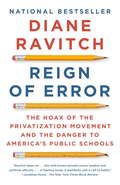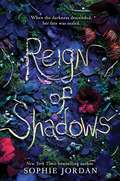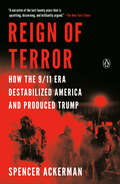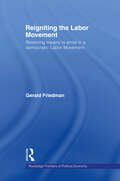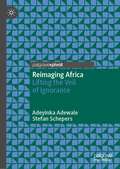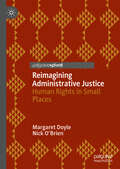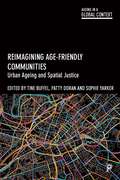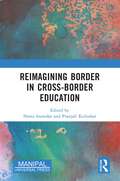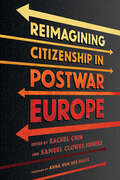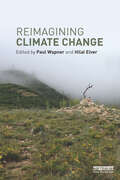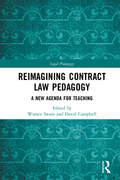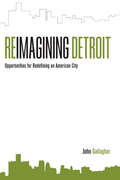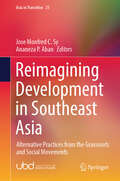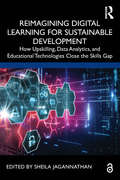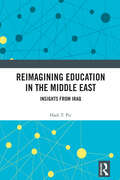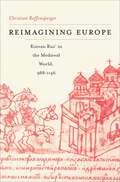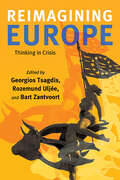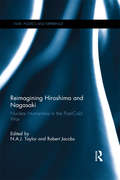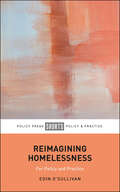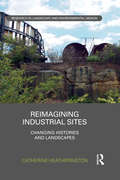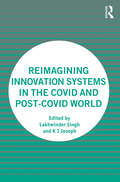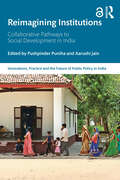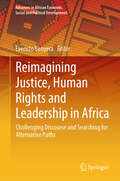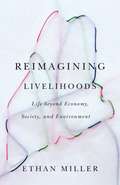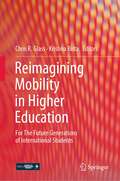- Table View
- List View
Reign of Error
by Diane RavitchFrom one of the foremost authorities on education in the United States, former U.S. assistant secretary of education, "whistle-blower extraordinaire" (The Wall Street Journal), author of the best-selling The Death and Life of the Great American School System ("Important and riveting"--Library Journal), The Language Police ("Impassioned . . . Fiercely argued . . . Every bit as alarming as it is illuminating"--The New York Times), and other notable books on education history and policy--an incisive, comprehensive look at today's American school system that argues against those who claim it is broken and beyond repair; an impassioned but reasoned call to stop the privatization movement that is draining students and funding from our public schools. In Reign of Error, Diane Ravitch argues that the crisis in American education is not a crisis of academic achievement but a concerted effort to destroy public schools in this country. She makes clear that, contrary to the claims being made, public school test scores and graduation rates are the highest they've ever been, and dropout rates are at their lowest point. She argues that federal programs such as George W. Bush's No Child Left Behind and Barack Obama's Race to the Top set unreasonable targets for American students, punish schools, and result in teachers being fired if their students underperform, unfairly branding those educators as failures. She warns that major foundations, individual billionaires, and Wall Street hedge fund managers are encouraging the privatization of public education, some for idealistic reasons, others for profit. Many who work with equity funds are eyeing public education as an emerging market for investors. Reign of Error begins where The Death and Life of the Great American School System left off, providing a deeper argument against privatization and for public education, and in a chapter-by-chapter breakdown, putting forth a plan for what can be done to preserve and improve it. She makes clear what is right about U.S. education, how policy makers are failing to address the root causes of educational failure, and how we can fix it. For Ravitch, public school education is about knowledge, about learning, about developing character, and about creating citizens for our society. It's about helping to inspire independent thinkers, not just honing job skills or preparing people for college. Public school education is essential to our democracy, and its aim, since the founding of this country, has been to educate citizens who will help carry democracy into the future.From the Hardcover edition.
Reign of Shadows
by Sophie JordanDestiny and darkness collide in this romantic, sweeping new fantasy series from New York Times bestselling author Sophie Jordan.Seventeen years ago, an eclipse cloaked the kingdom of Relhok in perpetual darkness. In the chaos, an evil chancellor murdered the king and queen and seized their throne. Luna, Relhok's lost princess, has been hiding in a tower ever since. Luna's survival depends on the world believing she is dead.But that doesn't stop Luna from wanting more. When she meets Fowler, a mysterious archer braving the woods outside her tower, Luna is drawn to him despite the risk. When the tower is attacked, Luna and Fowler escape together. But this world of darkness is more treacherous than Luna ever realized.With every threat stacked against them, Luna and Fowler find solace in each other. But with secrets still unspoken between them, falling in love might be their most dangerous journey yet.
Reign of Terror: How the 9/11 Era Destabilized America and Produced Trump
by Spencer Ackerman"In the genre of books that seek to explain why we are in the mess we are in, Reign of Terror is a formidable entry. To those who want to portray Trump as wholly exceptional, and discontinuous with the recent past, the book is an essential corrective." —The New Republic An examination of the profound impact that the War on Terror had in pushing American politics and society in an authoritarian directionFor an entire generation, at home and abroad, the United States has waged an endless conflict known as the War on Terror. In addition to multiple ground wars, it has pioneered drone strikes and industrial-scale digital surveillance, as well as detaining people indefinitely and torturing them. These conflicts have yielded neither peace nor victory, but they have transformed America. What began as the persecution of Muslims and immigrants has become a normalized, paranoid feature of American politics and security, expanding the possibilities for applying similar or worse measures against other targets at home. A politically divided country turned the War on Terror into a cultural and then tribal struggle, first on the ideological fringes and ultimately expanding to conquer the Republican Party, often with the timid acquiescence of the Democratic Party. Today's nativist resurgence walked through a door opened by the 9/11 era.Reign of Terror will show how these policies created a foundation for American authoritarianism and, though it is not a book about Donald Trump, it will provide a critical explanation of his rise to power and the sources of his political strength. It will show that Barack Obama squandered an opportunity to dismantle the War on Terror after killing Osama bin Laden. That mistake turns out to have been portentous. By the end of his tenure, the war metastasized into a broader and bitter culture struggle in search of a demagogue like Trump to lead it.A union of journalism and intellectual history, Reign of Terror will be a pathbreaking and definitive book with the power to transform how America understands its national security policies and their catastrophic impact on its civic life.
Reigniting the Labor Movement: Restoring means to ends in a democratic Labor Movement (Routledge Frontiers Of Political Economy Ser. #Vol. 94)
by Gerald FriedmanA century of union growth ended in the 1980s. Since then, declining union membership has undermined the Labor Movement‘s achievements throughout the advanced capitalist world. As unions have lost membership, declining economic clout and political leverage has left them as weak props upholding wages and programs for social justice. Since the earlies
Reimaging Africa: Lifting the Veil of Ignorance
by Stefan Schepers Adeyinka AdewaleThis book, through a politico-historical analysis, aims to provide a more balanced perspective regarding the nature of Africa’s relations with other global regions. It emphasizes the sophisticated nature of pre-colonial African politico-historical commentaries often overlooked or simplified. As such, the narrative avoids the usual misrepresentations which impress that African-European interactions are a history of European actions in an Africa generally devoid of anything similar to the cultures, institutions and abilities of Europe. Further, it contests the historical narrative that indigenous Africans have had no real active role vis-à-vis an assertive, dominating Europe in historical times. Within this book, the contestation of such narratives with evidence-based counter perspectives is of particular benefit for our current educational, social and political contexts.
Reimagining Administrative Justice: Human Rights in Small Places
by Nick O'Brien Margaret Doyle‘In their beautifully written book, O’Brien and Doyle tell a story of small places – where human rights and administrative justice matter most. A human rights discourse is cleverly intertwined with the debates about the relationship between the citizen and the state and between citizens themselves. O’Brien and Doyle re-imagine administrative justice with the ombud institution at its core. This book is a must read for anyone interested in a democratic vision of human rights deeply embedded within the administrative justice system.’—Naomi Creutzfeldt, University of Westminster, UK 'Doyle and O'Brien's book makes an important and timely contribution to the growing literature on administrative justice, and breaks new ground in the way that it re-imagines the field. The book is engagingly written and makes a powerful case for reform, drawing on case studies and examples, and nicely combining theory and practice. The vision the authors provide of a more potent and coherent approach to administrative justice will be a key reference point for scholars, policymakers and practitioners working in this field for years to come.'—Dr Chris Gill, Lecturer in Public Law, University of Glasgow 'This immensely readable book ambitiously and successfully re-imagines adminstrative justice as an instrument of institutional reform, public trust, social rights and political friendship. It does so by expertly weaving together many disparate motifs and threads to produce an elegant tapestry illustrating a remaking of administrative justice as a set of principles with the ombud institution at its centre.’—Carolyn Hirst, Independent Researcher and Mediator, Hirstworks This book reconnects everyday justice with social rights. It rediscovers human rights in the 'small places' of housing, education, health and social care, where administrative justice touches the citizen every day, and in doing so it re-imagines administrative justice and expands its democratic reach. The institutions of everyday justice – ombuds, tribunals and mediation – rarely herald their role in human rights frameworks, and never very loudly. For the most part, human rights and administrative justice are ships that pass in the night. Drawing on design theory, the book proposes to remedy this alienation by replacing current orthodoxies, not least that of 'user focus', with more promising design principles of community, network and openness. Thus re-imagined, the future of both administrative justice and social rights is demosprudential, firmly rooted in making response to citizen grievance more democratic and embedding legal change in the broader culture.
Reimagining Age-Friendly Communities: Urban Ageing and Spatial Justice (Ageing in a Global Context)
by Tine Buffel, Patty Doran and Sophie YarkerAvailable open access digitally under CC-BY-NC-ND licence. How can we design, develop and adapt urban environments to better meet the needs and aspirations of an increasingly diverse ageing population? This edited collection offers a new approach to understanding the opportunities and challenges of creating ‘age-friendly’ communities in the context of urban change. Drawing together insights from leading voices across a range of disciplines, the book emphasises the urgent need to address inequalities that shape the experience of ageing in urban environments. The book combines a focus on social justice, equity, diversity and co-production to enhance urban life. Exploring a range of age-friendly community projects, contributors demonstrate that, despite structural obstacles, meaningful social change is achievable at a local level.
Reimagining Border in Cross-border Education
by Neeta Inamdar Pranjali KirloskarUniversities are inherently and definitionally universal in their quest for the creation and dissemination of knowledge. They are set to defy borders that exist in parochial forms. Globalization which opened up borders has by design or default created inequalities and imbalances in knowledge systems. Undoubtedly, knowledge is power but there is difference in the power that is intrinsic to it and the power that is ascribed which is determined by dominant political and economic hierarchies. If knowledge predominantly flows from global north to global south, people seeking knowledge move from global south to global north. These imbalances are also seen within these regions, between cultures and communities, one claiming superiority over the other. These realities call for a reassessment of not only what constitutes knowledge, but also what encompasses the idea of borders. This book elaborates on the inclusive role of education that can act as an equalizer or as a catalyst for creating a level playing field across borders. Print edition not for sale in South Asia (India, Sri Lanka, Nepal, Bangladesh, Pakistan and Bhutan)
Reimagining Citizenship in Postwar Europe
by Samuel Clowes Huneke Rachel Chin Anna von der GoltzReimagining Citizenship in Postwar Europe maps the generation and growth of novel forms of belonging in the years after World War II, crisscrossing the continent from Madrid to Warsaw and from Athens to London. Even as Europe struggled to rebuild, new forms of identity, statehood, and citizenship were beginning to take shape.Rachel Chin and Samuel Clowes Huneke bring together a diverse group of scholars to illustrate how citizenship was reimagined in the postwar decades in unusual settings and unexpected ways, while highlighting how ordinary citizens, living in democratic and authoritarian regimes alike, struggled to forge new kinds of belonging through which to assert their human rights and dignity. Ultimately, Reimagining Citizenship in Postwar Europe contends that if we are to grapple with fraying citizenship in the twenty-first century, we must first look to when, how, and why citizenship originated in the calamitous years after World War II.
Reimagining Climate Change (Routledge Advances in Climate Change Research)
by Paul Wapner Hilal ElverResponding to climate change has become an industry. Governments, corporations, activist groups and others now devote billions of dollars to mitigation and adaptation, and their efforts represent one of the most significant policy measures ever dedicated to a global challenge. Despite its laudatory intent, the response industry, or ‘Climate Inc.’, is failing. Reimagining Climate Change questions established categories, routines, and practices that presently constitute accepted solutions to tackling climate change and offers alternative routes forward. It does so by unleashing the political imagination. The chapters grasp the larger arc of collective experience, interpret its meaning for the choices we face, and creatively visualize alternative trajectories that can help us cognitively and emotionally enter into alternative climate futures. They probe the meaning and effectiveness of climate protection ‘from below’—forms of community and practice that are emerging in various locales around the world and that hold promise for greater collective resonance. They also question climate protection "from above" in the form of industrial and modernist orientations and examine large-scale agribusinesses, as well as criticize the concept of resilience as it is presently being promoted as a response to climate change. This book will be of great interest to students and scholars of climate change, global environmental politics, and environmental studies in general, as well as climate change activists.
Reimagining Contract Law Pedagogy: A New Agenda for Teaching (Legal Pedagogy)
by David Campbell Warren SwainReimagining Contract Law Pedagogy examines why existing contract teaching pedagogy has remained in place for so long and argues for an overhaul of the way it is taught. With contributions from a range of jurisdictions and types of university, it provides a survey of contract law courses across the common law world, reviewing current practice and expressing concern that the emphasis the current approach places on some features of contract doctrine fails to reflect reality. The book engages with the major criticism of the standard contract course, which is that it is too narrow and rarely engages with ordinary life, or at least ordinary contracts, and argues that students are left without vital knowledge. This collection is designed to be a platform for sharing innovative teaching experiences, with the aim of building a new approach that addresses such issues. This book will have international appeal and will be of interest to academics, researchers and postgraduates in the fields of law and education. It will also appeal to teachers of contract law, as well as governmental and legal profession policymakers.
Reimagining Detroit: Opportunities for Redefining an American City
by John GallagherSuggests ways for Detroit to become a smaller but better city in the twenty first century and proposes productive uses for the city's vacant spaces.
Reimagining Development in Southeast Asia: Alternative Practices from the Grassroots and Social Movements (Asia in Transition #21)
by Jose Monfred C. Sy Ananeza P. AbanThis volume consolidates chapters from across Southeast Asia as a means of discussing alternative development pathways. It presents radical re-imaginings of how development might look, considered alongside the growing disillusionment over mainstream development models. In suggesting alternative models of development, it reframes participatory processes from the developing world, discussing practices of decolonization, anti-capitalism, plurality, anti-racism, effacing patriarchy, and ecological sustainability, designed and executed by grassroot communities and civil society organisations (CSOs). The grassroots and social movement paradigms highlighted in this collection seek to challenge and change the dominant model of development instituted in ASEAN, which have largely failed in meaningfully addressing the issues faced by different sectors. That the book project springs from an engagement between scholars and on-the-ground practitioners means that several chapters combine reflective, case-based viewpoints. To this end, the book is relevant to scholars, students, and practitioners working in areas related to Southeast Asian politics, economy, and culture.
Reimagining Digital Learning for Sustainable Development: How Upskilling, Data Analytics, and Educational Technologies Close the Skills Gap
by Sheila JagannathanReimagining Digital Learning for Sustainable Development is a comprehensive playbook for education leaders, policy makers, and other key stakeholders leading the modernization of learning and development in their institutions as they build a high value knowledge economy and prepare learners for jobs that don't yet exist. Currently, nearly every aspect of human activity, including the ways we absorb and apply learning, is influenced by disruptive digital technologies. The jobs available today are no longer predicators of future employment, and current and future workforce members will need to augment their competencies through a lifetime of continuous upskilling and reskilling to meet the demands of the Fourth Industrial Revolution. This book features curated insights and real-world cases from thought leaders throughout the world and identifies major shifts in content formats, pedagogic approaches, technology frameworks, user and design experiences, and learner roles and expectations that will reshape our institutions, including those in emerging economies. The agile, lean, and cost-effective strategies proposed here will function in scalable and flexible bandwidth environments, enabling education leaders and practitioners to transform brick-and-mortar learning organizations into digital and blended ecosystems and to achieve the United Nation’s ambitious Sustainable Development Goals by 2030.
Reimagining Education in the Middle East: Insights from Iraq
by Hadi T. PirThis book critically examines significant educational challenges in the broader Middle East, using insights from Iraq to explore historical, political, social, racial, religious, linguistic, and sectarian influences on education. It introduces new theoretical perspectives to explain why ineffective educational policies have persisted for the past century and proposes alternative approaches for research and policymaking in the region.Utilizing grounded theory methodology, the book includes interviews with 20 prominent Iraqi educational policymakers to reveal a shared worldview—termed the Traditional Paradigm—that continues to influence education and policy. It critiques dominant Western paradigms of critical theory and postmodernism for their inability to capture the complexities of the Middle East. Additionally, it introduces the Established Reality Theory, which draws on cognitive psychology and sociology to explain why ineffective policies persist despite shifts in regime. The book provides new insights, policy recommendations, and avenues for research to assist scholars and policymakers in tackling significant educational challenges.The book is relevant to scholars, researchers, and students in education, Middle Eastern studies, sociology, and political science. It is also valuable for policymakers, educators, and institutions seeking a deeper understanding of educational structures and reform in the Middle East.
Reimagining Europe
by Christian RaffenspergerAn overriding assumption has long directed scholarship in both European and Slavic history: that Kievan Rus' in the tenth through twelfth centuries was part of a Byzantine commonwealth separate from Europe. Christian Raffensperger refutes this conception and offers a new frame for two hundred years of history, one in which Rus' is understood as part of medieval Europe and East is not so neatly divided from West. With the aid of Latin sources, the author brings to light the considerable political, religious, marital, and economic ties among European kingdoms, including Rus', restoring a historical record rendered blank by Russian monastic chroniclers as well as modern scholars ideologically motivated to build barriers between East and West. Further, Raffensperger revises the concept of a Byzantine commonwealth that stood in opposition to Europe-and under which Rus' was subsumed-toward that of a Byzantine Ideal esteemed and emulated by all the states of Europe. In this new context, appropriation of Byzantine customs, law, coinage, art, and architecture in both Rus' and Europe can be understood as an attempt to gain legitimacy and prestige by association with the surviving remnant of the Roman Empire. "Reimagining Europe" initiates an expansion of history that is sure to challenge ideas of Russian exceptionalism and influence the course of European medieval studies.
Reimagining Europe: Thinking in Crisis (SUNY series in Contemporary French Thought)
by Georgios Tsagdis; Rozemund Uljée; Bart ZantvoortReimagining Europe comprises a series of contributions which address, in various ways, the relationship between Europe and continental philosophy/phenomenology. Europe is in crisis: a crisis that no longer designates a moment of decision, a critical point between a before and an after, but a state, a permanent mode of being, a constant emergency. At this juncture of Europe, the aporia of language confronts the aporia of history. We cannot speak, we must speak, we shall speak. As such, the contributions all engage with the idea that the question "what is Europe?" must measure up a series of questions, namely: what was it to be? What does it mean to initiate and sustain a project, such as Europe, if only at times, after the fact? The questions of internal and external borders, of homogeneity and coherence, identity and equality, legitimacy and rights, democracy and representation can only be raised insofar as the question of Europe, its destiny, and destination, is raised as a whole.
Reimagining Hiroshima and Nagasaki: Nuclear Humanities in the Post-Cold War (War, Politics and Experience)
by N.A.J. Taylor Robert JacobsThis edited volume reconsiders the importance of the attacks on Hiroshima and Nagasaki from a post-Cold War perspective. It has been argued that during the Cold War era scholarship was limited by the anxiety that authors felt about the possibility of a global thermonuclear war, and the role their scholarship could play in obstructing such an event. The new scholarship of Nuclear Humanities approaches this history and its fallout with both more nuanced and integrative inquiries, paving the way towards a deeper integration of these seminal events beyond issues of policy and ethics. This volume, therefore, offers a distinctly post-Cold War perspective on the nuclear attacks on Hiroshima and Nagasaki. The chapters collected here address the memorialization and commemoration of Hiroshima and Nagasaki by officials and states, but also ordinary people’s resentment, suffering, or forgiveness. The volume presents a variety of approaches with contributions from academics and contributions from authors who are strongly connected to the cities of Hiroshima and Nagasaki, and its people. In addition, the work branches out beyond the traditional subjects of social sciences and humanities to include contributions on art, photography, and design. This variety of approaches and perspectives provides moral and political insights on the full range of vulnerabilities – such as emotional, bodily, cognitive, and ecological – that pertains to nuclear harm. This book will be of much interest to students of critical war studies, nuclear weapons, World War II history, Asian History and International Relations in general.
Reimagining Homelessness: A Blueprint for Policy and Practice
by Eoin O'SullivanThe number of people experiencing homelessness is rising in the majority of advanced western economies. Responses to these rising numbers are variable but broadly include elements of congregate emergency accommodation, long-term supported accommodation, survivalist services and degrees of coercion. It is evident that these policies are failing. Using contemporary research, policy and practice examples, this book uses the Irish experience to argue that we need to urgently reimagine homelessness as a pattern of residential instability and economic precariousness regularly experienced by marginal households. Bringing to light stark evidence, it proves that current responses to homelessness only maintain or exacerbate this instability rather than arrest it and provides a robust evidence base to reimagine how we respond to homelessness.
Reimagining Industrial Sites: Changing Histories and Landscapes (Routledge Research in Landscape and Environmental Design)
by Catherine HeatheringtonThe discourse around derelict, former industrial and military sites has grown in recent years. This interest is not only theoretical, and landscape professionals are taking new approaches to the design and development of these sites. This book examines the varied ways in which the histories and qualities of these derelict sites are reimagined in the transformed landscape and considers how such approaches can reveal the dramatic changes that have been wrought on these places over a relatively short time scale. It discusses these issues with reference to eleven sites from the UK, Germany, the USA, Australia and China, focusing specifically on how designers incorporate evidence of landscape change, both cultural and natural. There has been little research into how these developed landscapes are perceived by visitors and local residents. This book examines how the tangible material traces of pastness are interpreted by the visitor and the impact of the intangible elements - hidden traces, experiences and memories. The book draws together theory in the field and implications for practice in landscape architecture and concludes with an examination of how different approaches to revealing and reimagining change can affect the future management of the site.
Reimagining Innovation Systems in the COVID and Post-COVID World
by Lakhwinder Singh and K J JosephCountries around the world are working to counter the devastating effects of the COVID-19 pandemic on their healthcare systems, economies, and industries. This book brings together strategies for the adoption of new technologies and innovation systems which would help re-invigorate social and economic institutions and help communities, especially in the Global South. The book focuses on innovation systems that address health and socioeconomic inequalities in countries such as India, Africa, Brazil, Costa Rica, and others. It looks into the responses of different countries to the shocks inflicted on the economy and health systems by the pandemic from the perspective of government institutions as well as businesses, industries, and communities. The pandemic forced many organizations to embrace various innovative strategies to contain the spread of COVID-19 and ameliorate the lives of people including employees, people from marginalized communities, and low-income groups who have suffered due to the disease. The chapters in this book study innovative interventions and community-based measures which reached many people and paved the way for policies which helped rebuild communities sustainably. The volume also analyses how these newly created and streamlined health and economic innovation systems will be carried forward in the post-COVID-19 world to address weaknesses in health and governance and address inequalities, especially for countries in the Global South. This book will be of interest to scholars and students of economics, political economy, health and economics, development studies, public policy, and sociology.
Reimagining Institutions: Collaborative Pathways to Social Development in India (Public Policy in India)
by Aarushi Jain Pushpinder PunihaThis book unpacks the complexities of social development in India, focusing on the institutional bottlenecks that hinder effective policy implementation.While governments and organizations design ambitious policies for economic growth, human capital development, education, agriculture, and social welfare, their impact is often diluted due to governance inefficiencies, bureaucratic inertia, and weak last-mile service delivery. Through a blend of empirical and evidence-based research, policy analysis, and real-world case studies, the book provides a comprehensive understanding of the mechanisms that drive – or obstruct – sustainable development in India. It explores pressing socio-economic issues, such as demographic shifts, sustainable futures, workforce dynamics, digital governance, e-markets, bureaucracy, and gender-based violence. The book serves as a vital resource for those seeking to understand governance challenges and the institutional reforms necessary for meaningful change. By highlighting both the problems and potential solutions, it fosters a dialogue on creating resilient and inclusive institutions that can effectively deliver on their promise of social progress.Part of the Innovations, Practice and the Future of Public Policy in India series, this volume will be of interest to policymakers, policy practitioners, researchers, development practitioners, and engaged citizens, particularly as we move towards a tech-savvy public sector. It will be an essential resource for students and researchers of development studies, sociology, public policy and governance, economics, and South Asian studies.The Open Access version of this book, available at http://www.taylorfrancis.com, has been made available under a Creative Commons [Attribution-Non Commercial-No Derivatives (CC BY-NC-ND)] 4.0 license.
Reimagining Justice, Human Rights and Leadership in Africa: Challenging Discourse and Searching for Alternative Paths (Advances in African Economic, Social and Political Development)
by Everisto BenyeraFailed attempts in Africa to develop, democratise and instil virtues of a just state and society which promote benevolent leadership and advance political and economic rights and freedoms call for a ‘new’ imagination. By exploring a wide range of issues concerning justice, human rights and leadership, this book makes two major contributions to the extant literature in each of these areas. Firstly, as a project in decoloniality, it constitutes an ‘epistemic break’ from mainstream logics and approaches to understanding state, society and development in Africa, presenting an approach that is filtered through a Euro-American lens that reifies the hegemony of a particular spatio-temporality. In other words, it emphasises the importance of situatedness by thinking from rather than about or with Africa. And secondly, it addresses a fundamental shortcoming in decolonial thought, which is often criticised for rejecting western paradigms of thought without providing viable alternatives. The issues covered include state failure in Africa, the geopolitics of US and NATO military interventions on the continent, individual states’ responses to international law, indigenous moral political leadership, authentic inclusion of marginalised voices in development practice, an endogenous approach to environmental ethics, and a spiritualist reflection on the need for Africa to chart her own course to political, social and economic redemption. By searching for alternative paths to justice, human rights and leadership, this book represents an effort to actualise the core vision of the African Renaissance to find ‘African solutions for African problems’.
Reimagining Livelihoods: Life beyond Economy, Society, and Environment (Diverse Economies and Livable Worlds)
by Ethan MillerA provocative reassessment of the concepts underlying the struggle for sustainable developmentMuch of the debate over sustainable development revolves around how to balance the competing demands of economic development, social well-being, and environmental protection. &“Jobs vs. environment&” is only one of the many forms that such struggles take. But what if the very terms of this debate are part of the problem? Reimagining Livelihoods argues that the &“hegemonic trio&” of economy, society, and environment not only fails to describe the actual world around us but poses a tremendous obstacle to enacting a truly sustainable future.In a rich blend of ethnography and theory, Reimagining Livelihoods engages with questions of development in the state of Maine to trace the dangerous effects of contemporary stories that simplify and domesticate conflict. As in so many other places around the world, the trio of economy, society, and environment in Maine produces a particular space of &“common sense&” within which struggles over life and livelihood unfold. Yet the terms of engagement embodied by this trio are neither innocent nor inevitable. It is a contingent, historically produced configuration, born from the throes of capitalist industrialism and colonialism. Drawing in part on his own participation in the struggle over the Plum Creek Corporation&’s &“concept plan&” for a major resort development on the shores of Moosehead Lake in northern Maine, Ethan Miller articulates a rich framework for engaging with the ethical and political challenges of building ecological livelihoods among diverse human and nonhuman communities. In seeking a pathway for transformative thought that is both critical and affirmative, Reimagining Livelihoods provides new frames of reference for living together on an increasingly volatile Earth.
Reimagining Mobility in Higher Education: For The Future Generations of International Students
by Krishna Bista Chris R. GlassThis book explores emerging populations of mobile international students in order to consider innovative and inclusive approaches for a more equitable and socially just higher education for new generations of international students. It offers critical reflections on the intersections of race, place, and space at universities hosting international students across multiple geographic and cultural contexts. The volume is designed to catalyze debate on how international student learning and exchange needs to be reimagined for new generations of students in a world of increasing complexity and virtual mobility. International student mobility in higher education is intended to serve as an educational experience that speaks to the need for more interculturally sensitive and globally competent learners. However, internationalization practices like study abroad have increasingly been influenced by neoliberalism, and dynamics of commodification and consumerism, emphasizing the private benefits of such experiences in terms of the social and economic benefits to individual participants. This raises the question of inequality in such internationalization practices; who is benefitting from it? As post-secondary institutions around the world become more and more internationalized, what are the undesirable effects of these developments? Given the rapid expansion of research on both internationalization and inequality in higher education, it is foreseeable that this book will become a much-referenced text within the field and profession.
